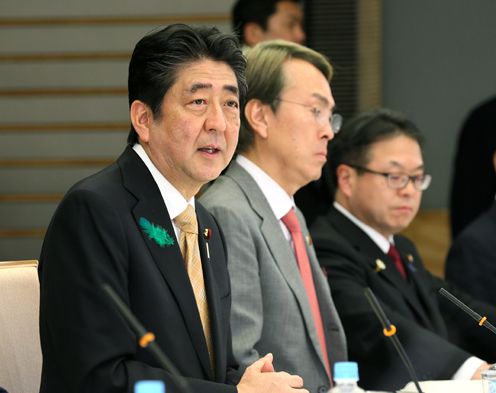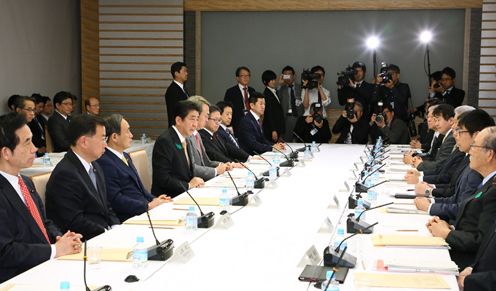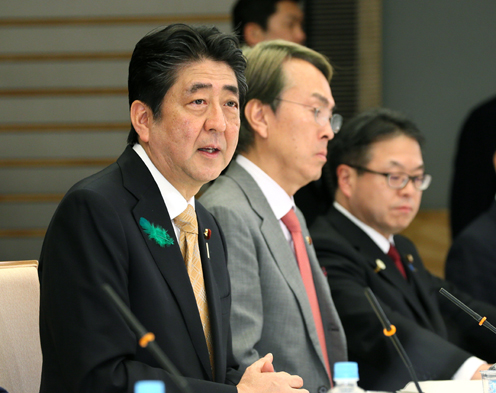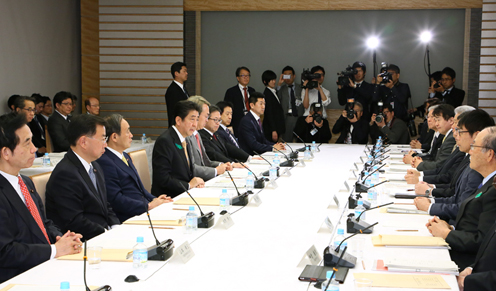Home > News > The Prime Minister in Action > April 2017 > Council on Investments for the Future
The Prime Minister in Action
Council on Investments for the Future
April 14, 2017

Photograph of the Prime Minister making a statement (1)

Photograph of the Prime Minister making a statement (2)
[Provisional Translation]
Prime Minister Shinzo Abe held the seventh meeting of the Council on Investments for the Future at the Prime Minister's Office.
At the meeting, debate took place on the construction of new medical, nursing care, and preventative health systems.
Based on the discussion, the Prime Minister said,
"Today, we heard from many practitioners on the initiatives for the construction of new medical and nursing care systems that will shift the focus of medical and nursing care to preventative healthcare and health management, and supporting people's independent living.
For a long time, the use of ICT and data for medical and nursing care was not moving forward as we had wanted. However, this technology has made extensive leaps forward, and is beginning to be implemented in places where medicine is practiced. In 2025, members of Japan's baby-boomer generation will all be over 75 years old. In order to overcome this turning point, I want to make it possible for every member of the public to be able to incorporate new technology into their lives easily and consider their health earnestly, such that each person will be able to increase his or her own life expectancy.
If we do not advance efforts in that direction, we will find ourselves facing an extremely difficult fiscal situation.
I myself once struggled with the difficult-to-treat disease ulcerative colitis. Thanks to the hard work of everyone in the medical field, good medications were developed for this disease, and I am currently able to manage it well. That said, those medications have caused me to face new issues. They give me a very large appetite, causing me to eat a lot. As a result, although I had been living with ulcerative colitis since the latter half of junior high school, I now must worry about issues I once thought were completely unrelated to me, including gaining visceral fat, worrying about body fat, and my cholesterol level. I hit the upper limits on tests for each of these issues. Because of that, I started going to the gym. I started to drink many types of aojiru (a vegetable drink) that help control fat levels, blood sugar, and cholesterol. But the effects are still not enough.
However, I think that if I could share daily information with medical personnel on things like how much I have been exercising, or the efforts I have been making, or records of the treatments and exams I have received, it would be possible for me to receive more advice about my daily life that is more detailed and more in tune with my personal situation. Even for people who have not paid much attention to their health, I think that it would be motivating for them if they could be shown their fat levels and liver functions and see whether or not their state of health was better or worse than the national average. If business owners and health insurance associations implement these kinds of initiatives at workplaces, I expect that it will lead to the healthiness of employees and a decline in the medical costs paid by companies. We will create a framework that will allow for the comparison by health insurance association of the health of employees, medical fees, and investments for health to national averages, and business owners will be notified of this information, encouraging further engagement. I expect that these initiatives will spread to all insurers across the country, and that they will raise the mindset that the public as a whole has about improving and maintaining health.
When people become sick, in order to prevent the illnesses from worsening and accelerate recovery, continuous follow-up by personal physicians is important. Patients can receive this kind of follow-up care comfortably and effectively through the combination of face-to-face consultations with long-distance consultations conducted online. We will thoroughly value this kind of new medical care during the next revision of healthcare reimbursements.
It is not possible to avoid aging, but it is possible through daily effort to ward off entering a state in which one needs nursing care. Even if nursing care becomes needed temporarily, it is possible for people to improve their health if they so wish through rehabilitation. We are now seeing such advanced initiatives. We will analyze big data, and make it clear what kind of support should be given for each situation in order to help people establish independence. We will also establish frameworks that highly evaluate initiatives that are effective at supporting people's independent living for reimbursement. The frontlines of nursing care are suffering from serious personnel shortages. We will support the introduction of robots and sensors that can reduce the burden borne by nurses through systems such as those for nursing care reimbursement and personnel assignment standards.
Japan faces a declining birthrate and aging population. However, through the power of technology, we can turn these challenging circumstances into opportunities. I spoke about the fiscal aspects earlier. By advancing these initiatives, I believe that we will be able to achieve a longer period of life in which we are able to live healthily, enabling us to have even richer lives. Today, we received a proposal from Minister Shiozaki and private sector members on how to achieve this. I want these measures to be immediately realized and implemented through collaboration among relevant ministries and agencies."


